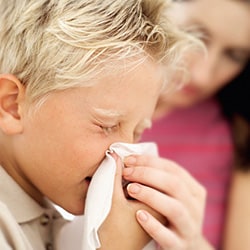Symptoms
Most people who get infected with non-polio enteroviruses do not get sick, or they only have mild illness, like the common cold.

Infants, children, and teenagers are more likely than adults to get infected and become sick because they do not yet have immunity (protection) from previous exposures to the viruses. Adults can get infected too, but they are less likely to have symptoms, or their symptoms may be milder. Symptoms of mild illness may include:
- fever
- runny nose, sneezing, cough
- skin rash
- mouth blisters
- body and muscle aches
Some non-polio enterovirus infections can cause
- viral conjunctivitis
- hand, foot, and mouth disease
- viral meningitis (infection of the covering of the spinal cord and/or brain)
- viral encephalitis (infection of the brain)
- myocarditis (infection of the heart)
- pericarditis (infection of the sac around the heart)
- acute flaccid paralysis (a sudden onset of weakness in one or more arms or legs)
- inflammatory muscle disease (slow, progressive muscle weakness)
Infants and people with weakened immune systems have a greater chance of having these complications.
People who develop myocarditis may have heart failure and require long-term care. Some people who develop encephalitis or paralysis may not fully recover.
Newborns infected with a non-polio enterovirus may develop sepsis (the body’s overwhelming response to infection which can lead to tissue damage, organ failure, and death). However, this is very rare.
Non-polio enterovirus infections may play a role in the development of type 1 diabetes in children.
For information about risks to pregnant women, see Pregnancy & Non-Polio Enterovirus Infection.